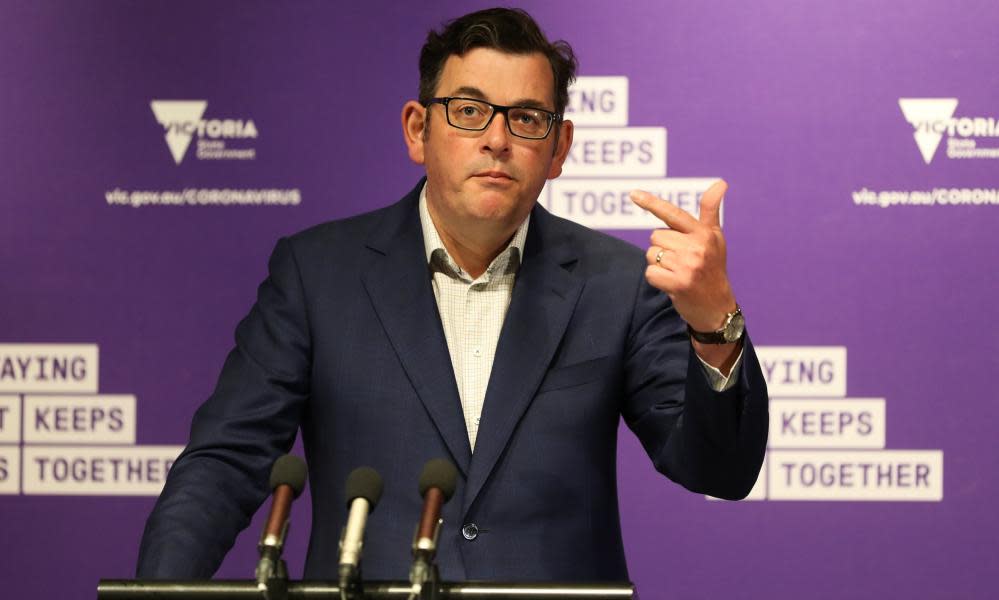Daniel Andrews lashes Josh Frydenberg over attack on Victoria's Covid strategy

Daniel Andrews has launched a stinging attack on the federal treasurer, Josh Frydenberg, saying he is “not a leader, he is just a Liberal” who likes to “play politics all day every day”.
“Victorians are sick of it,” the premier said.
Frydenberg did a round of interviews on Monday morning during which he said the slow easing of restrictions in Victoria showed the state government had a “callous indifference” to small business, and that people needed “to be allowed to get back to work”.
“There’s been a callous indifference in Victoria from the government to the loss of jobs and to the plight of small business,” Frydenberg said in a video posted to Twitter. “The bloody-mindedness is unforgivable.”
Asked about the comments during his daily press conference, Andrews responded: “It’s all about the politics with this bloke, isn’t it?”
“That’s all he does. He is not a leader, he is just a Liberal. All he does is play politics, every day, and I just don’t think that is fair, and I think Victorians are sick of it. Victorians want their family protected, they wanted their health issues dealt with so we can open up. All he does is play politics in the midst of a global pandemic.”
The state recorded four new cases of the virus and one death in the 24 hours to Monday.
On Sunday Andrews announced that from Monday some social restrictions in Victoria would be eased, while hairdressers, dog grooming businesses and real estate inspections would be allowed to reopen. Retail, hospitality and beauty and personal services would return from 2 November if case numbers supported it, he said, with some limits, such as the number of people allowed inside bars and restaurants.
The chief executive of the Business Council of Australia, Jennifer Westacott, said that was an “inexplicable and unacceptable delay for Victorians and small businesses who are hanging on by a day, not a week”.
“Adopting a wait-and-see approach to easing restrictions is not an answer for people who face a bleak Christmas and businesses that are trying to get back up and running,” she said.
“There is no sound reason to continue the restrictions on business, especially with case numbers clearly on a downward trajectory. Simply being allowed to go for a haircut or outside a bit more when you have no job, no money and your business has failed is just not good enough.”
Andrews said: “[Business groups] are there to advocate on behalf of their members and we work with them closely. Sometimes they will be pleased with announcements and other times they want more.”
In New South Wales, Gladys Berejiklian announced further easing of restrictions to take effect from Friday, when restaurants will be able to accept group bookings of up to 30 people, while 30 people will be able to gather outside. She said while she wanted to give hospitality enough information to plan for Christmas and summer, “I can sense too much relaxation – people are getting back into normal life.
“Please know that, until the end of the pandemic, none of us can have a normal life. But what we can do is make sure that we maintain Covid safety and make sure that, within the rules, we have as good a time, as free a time, as possible.”
Victoria’s Department of Health and Human Services confirmed on Sunday night that all 55 travellers who recently arrived in Victoria from New Zealand had been spoken to.
“The travellers, some in family groups and most staying in private homes, were provided with information about Covid-19 and the current Victorian health directions,” the department said in a statement.
The Western Australian premier, Mark McGowan, confirmed on Sunday that 23 New Zealanders who entered the state via NSW without exemptions were now in quarantine.
Asked on Monday about how the travellers arrived in Victoria despite the state not being part of the trans-Tasman bubble, Andrews said it seemed as though the bubble applied to every part of the country, “not just those that said yes”.
“Anyway, that’s where it’s at, we can’t change that.”
He said health authorities were trying to track down a further 10 travellers from New Zealand who had entered the state in recent days.
Travel advice had also been updated to make it clear Victoria’s borders were open to people from New Zealand if travellers passed all immigration and biosecurity requirements, he said.
“We just need to know who is coming and when, and we need to speak to them and make sure they know all the rules,” he said.
The Australian Border Force commissioner, Michael Outram, defended the travel bubble arrangements at a Senate estimates hearing on Monday, saying he was unaware of any concerns being raised through meetings with Victorian officials.
“Once a passenger leaves the international terminal, once they depart the customs-controlled area at the back of the baggage hall, they cease to be an international passenger or traveller – they’ve entered Australia,” he told a Senate committee.
Outram confirmed that while Victoria had opted not to join the travel bubble with New Zealand, people who cleared international arrival checks were free to move around the country, subject to state-imposed travel restrictions.
“The travel bubble stops at the international terminal at Sydney airport. It doesn’t extend across the road to the domestic terminal. It doesn’t extend down the federal highway to the Victorian border. We’re the Australian Border Force, we’re responsible for the international border.”
He said there had been a meeting last Friday at 2pm at Melbourne airport, which was convened by Victoria’s Department of Health and Human Services and attended by a junior ABF officer. “Clearly at the operational level, at least, the Victorian services recognised what was happening. No objections were raised.”


